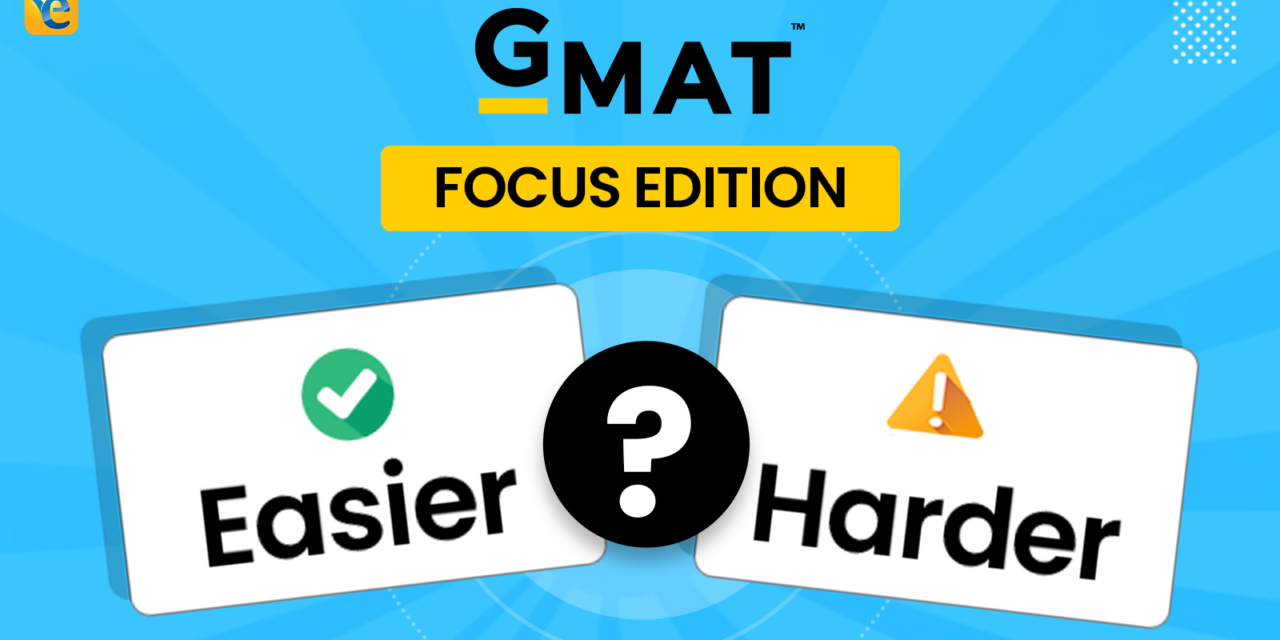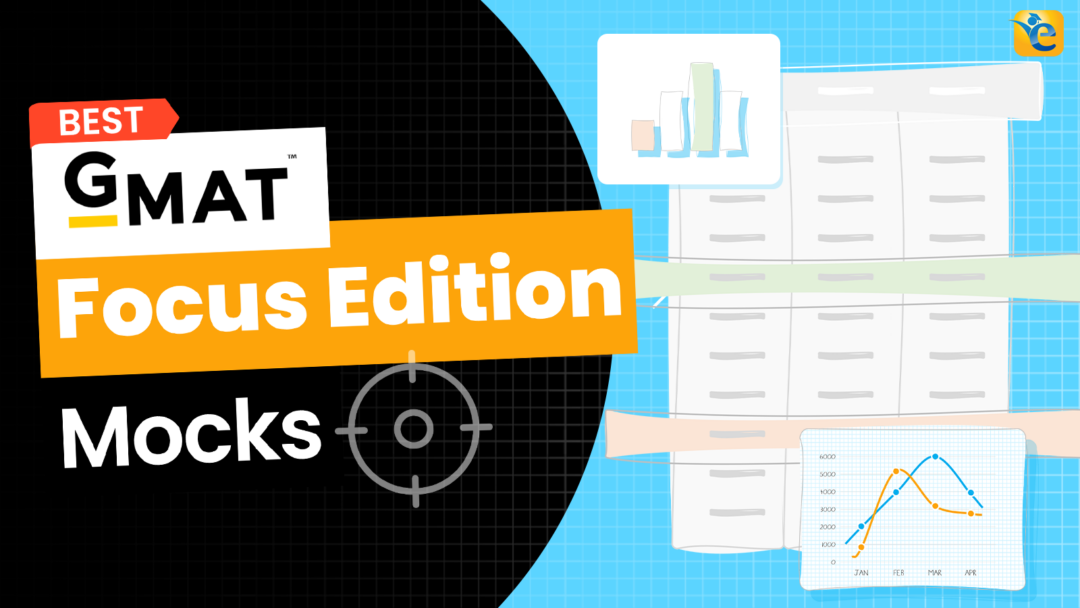Most people ask me, “Is the GMAT Focus Edition Hard?” My answer to this question – It depends. Depends on what, you may ask? It hinges on various factors. In this article, we’ll unravel those factors, helping you make a more informed decision about the GMAT Focus edition.
The best way to understand the GMAT Focus exam pattern and its difficulty level is by trying the test out for yourself. Try Free GFE Mock now.
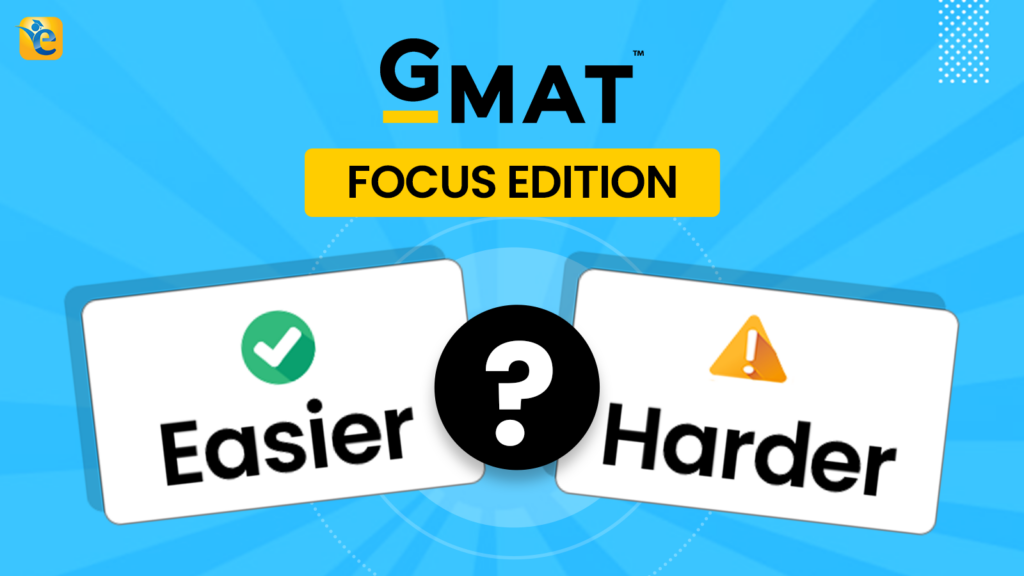
- For whom is the GMAT Focus edition hard?
- GFE vs. GCE: What has changed and what remains constant
- What Does ‘Hard’ Truly Mean in the GMAT Context?
- Evaluating the GMAT Focus difficulty level for Different GMAT Personas
- Why the GFE Might Just Be Your Perfect GMAT Buddy
- Understanding the GMAT Focus Edition Scoring Mystery
- Conclusion
Watch this video to easily understand whether the GMAT Focus Edition is easier or harder for you?
For whom is the GMAT Focus edition hard?
Let’s not beat around the bush. Whether the GFE is challenging or not truly rides on:
Your Background
The GFE experience can vary greatly depending on where you’re coming from, both academically and professionally. For instance:
- Arts and Humanities Graduates: If you’re someone who’s immersed in literature, history, or other non-quantitative fields, initially, the GFE might seem like a dense forest. It emphasizes more on analytical skills, which might not have been the primary focus in your studies. But remember, with the right map (or prep strategy), even the densest forests can be navigated.
- STEM Graduates: Those hailing from Science, Technology, Engineering, and Mathematics fields might find certain sections of the GFE more in their alley. Your academic training likely provided a sturdy foundation for quantitative reasoning and analytical skills, both of which the GFE treasures.
- Business and Commerce Graduates: For those who’ve been juggling balance sheets, profit-loss statements, or marketing strategies, the GFE’s data-centric approach might seem familiar. However, it still demands a keen understanding and application of these concepts, not just rote learning.
- Others: If you come from a unique or interdisciplinary background, your experience will be tailored to what you bring to the table. It might be a mix of comfort in some areas and challenges in others. Embrace your unique perspective, and it might just give you an edge.
Ready to tackle the GMAT Focus Edition? e-GMAT offers a Personalized Study Planner and top-notch Free GFE mock exam to help you prepare effectively. As the most reviewed GMAT prep company on GMAT Club with 2600+ reviews we’re here to support your GFE journey. Take advantage of our free trial with the best quality content. Start your path to success today!
Your Learning Style
The way each person absorbs, processes, and applies information can drastically influence their GFE journey:
- Deep Divers: If you’re the kind of learner who prefers to delve into fewer concepts but ensure a profound understanding of each, then the GFE might feel like familiar territory. This test places significant emphasis on the application of core principles in varied situations. So, your inclination to explore topics in depth can be a potent weapon in your GFE arsenal.
- Surface Skimmers: For those who lean towards acquainting themselves with a wide range of concepts without diving too deep into each, the GFE could present certain challenges. The GFE demands not just knowledge, but a nuanced application of that knowledge. Hence, merely brushing the surface might leave you wanting in some sections of the test.
- Adaptive Learners: Some individuals have a chameleon-like learning style, adapting based on the subject or the situation at hand. For such learners, the GFE offers an opportunity to strike a balance. While breadth of knowledge is essential, prioritizing depth in key areas can be the game-changer.
- Practical Enthusiasts: If you’re someone who thrives on applying theoretical knowledge to real-world scenarios, the GFE’s data-driven approach might resonate with you. The test, in many sections, seeks to gauge how candidates would handle situations grounded in real business challenges, making your practical approach a significant asset.
Your learning style, while innate, isn’t set in stone. Recognizing your natural inclinations and working to incorporate a holistic approach can significantly boost your GFE readiness. It’s all about playing to your strengths while diligently working on potential weaknesses.
The wait is over! Now, you can create your Personalized Study Plan for the GMAT focus Edition.
GFE vs. GCE: What has changed and what remains constant
Navigating the world of GMAT might sometimes feel like trying to keep up with a fast-paced series with unexpected plot twists. One of the most significant shifts in recent times has been the transition from the General GMAT (GCE) to the GMAT Focus Edition (GFE). Let’s get a clearer picture of what has changed, and perhaps more importantly, what remains a constant.
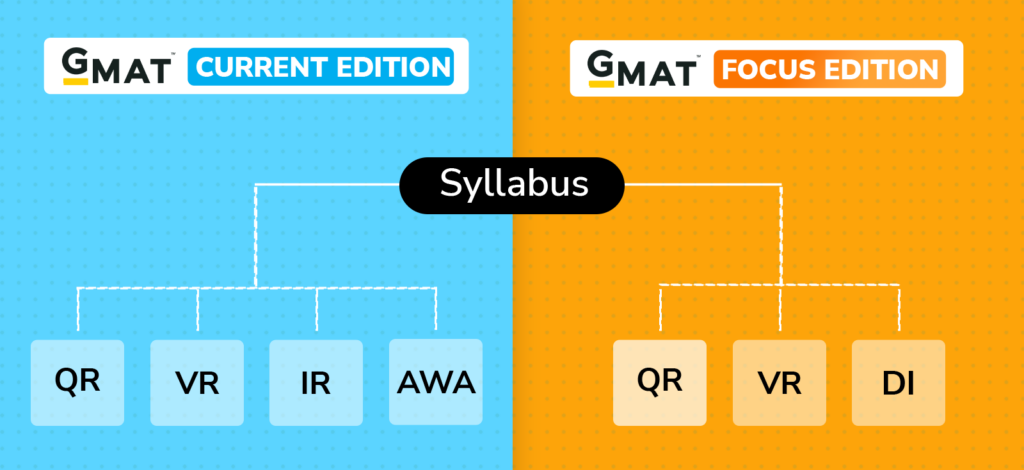
What’s New in the GFE?
- Farewell, Sentence Correction: GMAC decided to bid adieu to the Sentence Correction section in the GFE. This change might be a relief for some, especially those who found the nuances of grammar and sentence construction a tad challenging.
- Geometry Takes a Backseat: Geometry, once a prominent player, has been shown the exit. So, if you’ve been wrestling with those theorems and postulates, you can let out a sigh of relief.
- Enter Data Insights: In its pursuit to make the GMAT more reflective of real-world business scenarios, the GMAC has ushered in a more robust data interpretation segment in the GFE. This change underscores the increasing importance of data-driven decision-making in the business world.
- Elimination of the AWA Section : GMAC has opted to exclude the Analytical Writing Assessment (AWA) from the GFE. This alteration seeks to ease the burden on individuals who find crafting essays to be a particularly challenging component of the examination.
The Constants – The Heart and Soul of GMAT:
- Quantitative Reasoning: While the specifics might have seen tweaks, the core essence of testing quantitative skills remains. Expect to solve problems, crunch numbers, and apply mathematical reasoning.
- Verbal Reasoning: Even with the departure of Sentence Correction, the GFE still emphasizes strong verbal skills. Critical reasoning and reading comprehension remain vital, testing candidates on their ability to evaluate arguments and derive insights from complex textual information.
Read our GMAT Focus Edition Syllabus article for a full syllabus overview.
What Does ‘Hard’ Truly Mean in the GMAT Context?
When we label something as ‘hard,’ especially an exam like the GFE, it’s crucial to unpack that term. What are we really getting at when we use this descriptor? Let’s dissect this:
- Time Investment: At its core, ‘hard’ often correlates with the amount of time one might need to invest. Does preparing for the GFE demand more hours of studying, more practice tests, or more revision compared to the GCE? A significant time commitment can be daunting, but it’s essential to gauge whether this time translates to mastery or just rote repetition.
- Content Familiarity: Another dimension of ‘hard’ pertains to the familiarity with the material. Does the GFE introduce concepts that are entirely new or more advanced than its predecessor? And if so, how steep is the learning curve? Treading unknown territory can be challenging, but it’s also an opportunity for growth.
- Application Depth: It’s not just about learning concepts but how deeply they need to be applied. A test that demands nuanced, layered application of knowledge, instead of just surface-level recall, can be perceived as ‘harder.’ It pushes candidates to not just know, but to understand and apply.
In essence, when we talk about the GFE being ‘hard,’ we’re reflecting on a blend of factors ranging from the sheer volume of study to the depth of understanding required. Recognizing what ‘hard’ means for you personally can be a catalyst in shaping your preparation strategy, ensuring you’re not just working hard but also working smart.
Start your GMAT Focus journey with our free GMAT Focus mock test to gauge your baseline score, and then create a personalized study plan. Dive into our free trial for targeted prep. Trusted by thousands with 2600+ reviews on GMAT Club, e-GMAT is your partner in mastering the GMAT. Contact us at support@e-gmat.com for expert guidance.
Evaluating the GMAT Focus difficulty level for Different GMAT Personas
Understanding how the GMAT Focus Edition (GFE) may resonate with different learners is essential. Let’s examine how each GMAT persona might navigate the GFE:
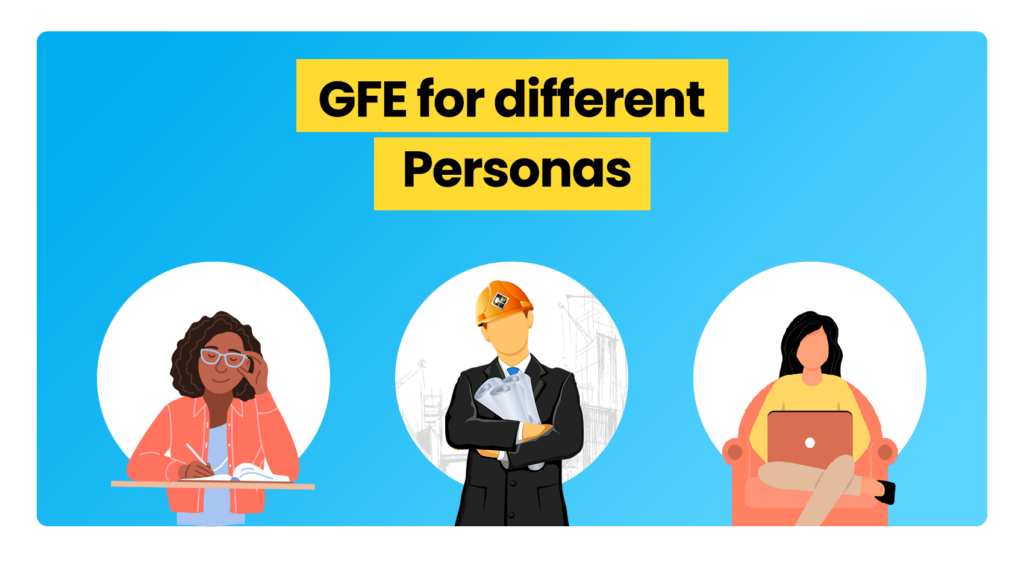
1. The Arts Aficionado:
- GFE Evaluation: Arts enthusiasts might find the terrain of the GFE somewhat formidable due to its pronounced analytical and data-driven emphasis.
- Challenging Aspects:
- Data Insights: Absence of consistent interactions with data analytics in their background might make grappling with the Data Insights section more challenging.
- Quantitative Reasoning: The typically non-quantitative nature of their academic journey might make the Quant section appear more demanding.
- Aspects They Might Find Less Favorable:
- Redistribution of Weight: The re-balancing, which reduces the Verbal section’s weight from 50% to 33.33%, might not sit well with this group. This is especially so since the Verbal section might have been their strong suit in the classical GMAT.
- Omission of Sentence Correction: The removal of the Sentence Correction section, often a strong area for arts students, might be viewed as a missed scoring opportunity.
2. The Engineer/Consultant Dynamo:
- GFE Evaluation: Given their numerical acumen and penchant for analytics, engineers and consultants are likely to find the GFE’s structure more in their wheelhouse.
- Challenging Aspects:
- Omission of Sentence Correction: While many in this group might have struggled with this section, some who had honed their skills in it might lament its absence.
- Data Insights: Despite a comfort with numbers and data, the refined focus on intricate Data Insights might necessitate a deeper dive into specific analytical skills.
- Aspects They Might Favor:
- Balanced Weight Distribution: The equal weightage given to Quant, Verbal, and Data Insights can be advantageous, allowing for a broader canvas to demonstrate their skills.
- Reduced Emphasis on Verbal: While the verbal section remains essential, its weight reduction might be seen as a relief for those who found it particularly challenging.
3. The Balanced Explorer:
- GFE Evaluation: With a mixed academic and professional background, their GFE experience is likely to be more balanced, presenting both opportunities and challenges.
- Challenging Aspects:
- Data Insights: While they might have some exposure to data, the emphasis on in-depth data insights could require additional preparation.
- Shift in Emphasis: Adapting to the new structure, especially with the removal of familiar sections like Sentence Correction, might present an initial learning curve.
- Aspects They Might Appreciate:
- More Rounded Test Structure: The GFE’s tripartite focus – Quant, Verbal, and Data Insights – can provide a comprehensive platform to showcase their multifaceted skill set.
- Less Emphasis on Pure Verbal Skills: The reduced weight on the Verbal section can be beneficial, especially if it wasn’t their strongest suit in the classical GMAT.
In essence, the GFE, with its nuanced changes, offers a distinct landscape for each GMAT persona. Recognizing where opportunities lie and where challenges might emerge is pivotal in crafting a focused and strategic preparation journey.
Did you know 9 out of 10 MBA Admissions decisions are made using a GMAT score? We can give you access to quality online content to prepare for GMAT. We have delivered 10x 700+ scores than the average GMATClub partner. Why don’t you take a free trial and judge it for yourself?
Why the GFE Might Just Be Your Perfect GMAT Buddy
Whether you perceive the GMAT Focus Edition (GFE) as a more challenging hurdle or a breezier path, one thing is undeniable: the GFE is an incredibly relevant test for today’s B-School applicants. Its design and emphasis align seamlessly with the changing dynamics of modern business education. Let’s explore why this revamped edition might just be the ideal fit for your MBA aspirations:
- More Aligned with the 2020s MBA: The GFE has been restructured to resonate with the shifting demands of MBA programs in the 2020s. As business curricula evolve to mirror a rapidly transforming global economy, the GFE stands as a testament to these progressive shifts.
- Preparation for an AI-Driven Business World: The contemporary business arena is increasingly intertwined with artificial intelligence and intricate data analytics. The GFE’s pronounced emphasis on Data Insights ensures candidates are primed for success in this data-centric realm.
- Enhanced Emphasis on Data-Driven Decisions: Crafting informed, data-backed decisions is paramount in today’s business climate. The GFE accentuates this skill set, challenging candidates to dissect intricate data and convert these insights into actionable strategies.
- Gearing Up for Employability: The GFE is crafted not just as an academic assessment but as a bridge to employability. It sharpens the very skills that modern employers fervently seek, ensuring graduates are equipped to navigate real-world business intricacies.
- Fostering a Comprehensive Skill Set: Beyond data and analytics, the GFE guarantees a holistic preparation, assessing candidates across a gamut of skills from quantitative reasoning to verbal acumen. It’s a testament to the multifaceted demands of contemporary business roles.
In essence, the GMAT Focus Edition is not just another iteration of a business school entrance test. It’s a forward-thinking, relevant gauge designed to ensure MBA aspirants are not just school-ready but world-ready, primed for thriving in a dynamic business landscape.
Read this article to know – Which business schools will accept the GMAT Focus Edition?
Understanding the GMAT Focus Edition Scoring Mystery
If you’ve been entangled in GMAT circles or perhaps spent some time on MBA forums, there’s no doubt you’ve come across the buzz about the GMAT Focus Edition (GFE) scores. There’s chatter everywhere, from students comparing it with the classic GMAT to experts deliberating over what these scores precisely signify. If it all feels a tad overwhelming, fret not. Let’s break it down.
- The GFE Scoring Mechanism: In the GFE, the scoring might seem different, especially if you’re comparing it with the old GMAT, where only a score starting with 7Xx was considered good (87th percentile). A score starting with 7Xx on the GFE is 99th percentile (instead of 87th) and hence is a lot more challenging to obtain. The GFE equivalent of 700 is a somewhat indifferent looking 645. But it’s essential to understand that GFE’s scoring scale doesn’t dilute or amplify its value. It’s just a recalibrated measure.
- B-School Admissions’ Perspective: Now, you might wonder: “How will B-schools interpret my GFE score?” Here’s where the experience of admissions committees comes into play. These teams have been expertly handling and assessing diverse GPAs from global applicants for years, from different universities, countries, and grading systems. They have a knack for contextualizing scores, understanding the nuances and intricacies of different educational backgrounds.
- Think of it this way: if admission officers can discern the weightage of a GPA from an obscure college in a remote part of the world and juxtapose it with a GPA from an Ivy League university, deciphering the GFE scores is well within their wheelhouse. They’ll undoubtedly crack the GFE score code, ensuring that every applicant is evaluated on a level playing field.
- In Conclusion: Your GFE score is a reflection of your skills, aptitude, and readiness for an MBA program. Trust that B-schools, with their vast experience, will interpret it accurately, ensuring you get the recognition your efforts deserve. Instead of getting mired in score comparisons and conversions, focus on presenting the best version of yourself, both in the exam and in your applications. The GFE, after all, is just one piece of your entire MBA application mosaic.
Conclusion
In summary, the GMAT Focus Edition (GFE) is a dynamic, evolving test aligning with the demands of modern business education. Its perceived difficulty varies based on your academic background and learning style. With the removal of Sentence Correction and Geometry sections and a new emphasis on Data Insights, the GFE is designed to test a broader skill set, preparing students for an AI-driven, data-centric business world. The ‘hardness’ of the GFE is a mix of time commitment, familiarity with content, and depth of application. Overall, the GFE is more than a test; it’s a comprehensive preparation for MBA aspirants, ensuring readiness for both business school and real-world business challenges. Embrace this as an integral part of your MBA journey, focusing on showcasing your best in the exam and applications.
Ready to tackle the GMAT Focus Edition? e-GMAT offers a Personalized Study Planner and top-notch Free GFE mock exam to help you prepare effectively. As the most reviewed GMAT prep company on GMAT Club with 2600+ reviews we’re here to support your GFE journey. Take advantage of our free trial with the best quality content. Start your path to success today!


